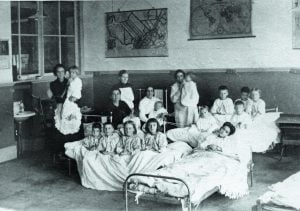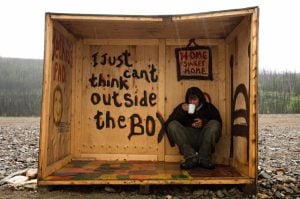
History
The outbreak and its aftermath
The little-known story of the 1918 Spanish Flu and how we're preparing for the next great pandemic
- 3183 words
- 13 minutes
Exploration

As the world shut down due to COVID-19, Markus Pukonen was arriving in India, having just cycled about 2,000 kilometres from Nepal.
Coming home was never really an option — Pukonen is currently five years into circumnavigating the globe without using a motorized vehicle, to support nonprofits and promote sustainable travel, and just wasn’t ready to give up on his Routes of Change journey.
As he rides out the pandemic in India, he spoke with Canadian Geographic about his experience and the importance of slowing down.
I wasn’t sure how serious the lockdown would get, but I was very prepared to just not move and stay put. I thought about going to a yoga retreat and spending some time editing videos, but I ended up being more social because I got stuck in a guest house with travellers from all over the world. Coming home was never really an option.
Surprisingly, none of my family or friends were saying, “Come home.” Everyone around me had family saying “We’re really worried about you, come home,” and no one was doing that to me. I sort of felt left out, but I think my family and friends knew I’d never consider it. Maybe they wanted me to come home … but they didn’t say anything.
When lockdown happened there were rumours they were going to ship all the foreigners home. I had a bag ready and if that happened I was going to go off into the forest, off the grid and wait until I could figure stuff out.
Pretty much everything I had lined up is not going to happen. I was planning a standup paddleboard down the Ganga River. When I came to Nepal and India, I was hoping to figure out a way though Pakistan, Iran or China, to Europe. Because of the political situations and visas, I was realizing that my route on land would be impossible to do. I began looking more seriously, instead at crossing the Indian Ocean.
That’s led me to this sailboat for sale in the south of India, so now I’m trying to figure out a way to get to there. There’s one large state [I would need to travel through] that’s the worst hit [in India] (Maharashtra). Right now it’s impossible to travel through it, or to get a pass. Most people are saying it won’t be possible until October … but things are changing week to week. It could change!
My plans have changed so much on this trip as a whole. When I started, in Toronto, I didn’t know how I was going to get across the Pacific Ocean. I was heading west across Canada and thinking, “when I get to the Pacific I’ll have it figured out”. Then, two weeks into the trip, somebody invited me to sail with them. That’s how the whole trip has gone. I have to be willing to just let my plans not work out. I just don’t get attached … it’s not hard. he main bummer is I can research and plan a whole bunch and then those plans fall apart, but I only have so much time to make the next part happen.
The end will be Toronto, but I don’t know how long it will take me. I want to get to Europe, South Africa’s on the way … I want to get to South America. If I have my own sailboat, I’m a bit more independent and can make my plans more smooth, but we’ll see. It could be a year or it could be another three or four.
When I started, I didn’t have a good idea on how long this would take. Part of the challenge of finding the funding for this was that I didn’t know how long it would take or how it would work out. That’s what I love about travelling — just living with my instinct and in the moment. I guessed five years. Now it’s been five years.
One of the biggest things I’ve learned from this journey is that slowing down is the way to go. I think the pandemic has opened peoples’ eyes to that too. The advantage of moving slow, of slowing down our lives and development … thinking more about what we’re doing, spending more time with ourselves. We learn more about who we are and what’s important in our lives. For me, slowing down on this trip feels right and I’m comfortable with it. We’ll see where it takes me.
Are you passionate about Canadian geography?
You can support Canadian Geographic in 3 ways:

History
The little-known story of the 1918 Spanish Flu and how we're preparing for the next great pandemic

Travel
An insider’s account of the modern-day gold rush

People & Culture
What does democracy look like in your community?

Mapping
David Waltner-Toews speaks about his updated book On Pandemics: Deadly Diseases from Bubonic Plague to Coronavirus